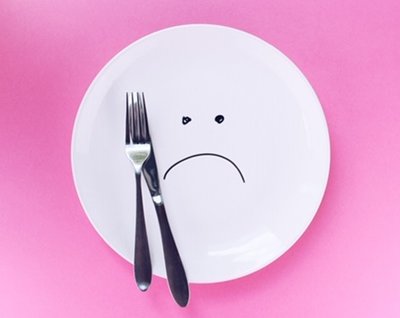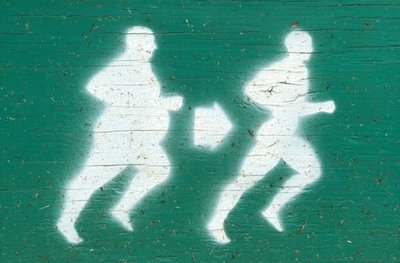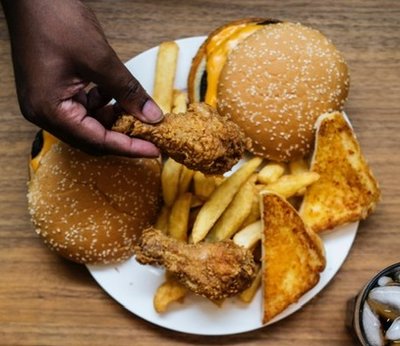 Intermittent fasting.
Intermittent fasting.
It’s a trendy topic now since celebrities and fitness experts alike have tried it out. But just like any other “diet” that actually works, intermittent fasting is nothing new.
Many people around the world, including those who unfortunately don’t have easy access to food, have eaten like this for centuries.
My fellow citizens in the US are blessed with the opportunity to eat three meals a day. And we have the audacity to question anyone who says we can survive with less…
But that’s a talk for another day.
This post will give you a brief rundown of intermittent fasting and three of it’s more popular methods. Then I’ll describe what to expect when you try it.
I won’t bore you with all the data and research here though—I show enough of that at my day job.
I’m not a doctor or a nutritionist. I’m just a guy on the internet who’s done this for four years. And I’d like to share my experience with you.
What Is Intermittent Fasting?
Intermittent fasting, or IF, is a simple eating method.
It generally involves a restriction on the times you eat, followed by periods of either very low, or no calorie intake.
This typically means a person will skip breakfast and then eat normally the rest of the day.
(Quick note: A lot of IF’ers hate when people say we skip breakfast. The first meal you eat will always break your overnight fast, no matter when you eat it. Just food for thought.)
IF isn’t another diet trend or fad though. It’s actually not a diet at all.
The only thing you restrict on IF is the time you eat. And this is one reason why it’s so popular.

You can adapt almost any diet or nutrition plan to the IF framework. Vegan, Keto, Paleo, you name it, they all work with IF.
But if intermittent fasting isn’t a diet, and you don’t change what you eat, then why do it?
I’ll answer that question with one word:
Stability.
Yes, research suggests that IF has anti-aging, muscle-building, and mental-strengthening benefits—some of which I’ll discuss later—but the biggest benefit is the stability it adds to your routine.
We all know what’s gonna happen when our coworker gets off that new diet craze (if they were ever truly on it to begin with).
They’ll gain the weight right back.
Why is that?
Because the only weapon they have to prevent a relapse is their willpower. They never formed a system to keep their eating, and by extension, their body, in check.
So they get stuck in a cycle of losing and then gaining weight until they just stop trying. Then it stays for it good.
This is where IF is helpful. It gives you a disciplined approach to your eating even if you’re not on a diet.
The fasted state also allows your body to exhaust the energy provided by your meals, and then pull from other energy sources—one of which is body fat.
So let’s take a look at some popular IF methods. Then I’ll show you what to expect when you try it.
Intermittent Fasting Methods
The 16:8 Method
Alternate Name: Leangains Method
Popularized by: Martin Berkhan
16:8 is my bread and butter. I’m so accustomed to it now that it’s just my normal way of eating.
It is by far the most sustainable and beginner-friendly form of IF.
The method generally involves a fast of 16 hours along with an 8 hour eating window. Although women are advised to fast 14 to 15 hours due to differences in body composition and the regularity of the fasts.
I personally eat from 10 AM to 6 PM every day. Then I fast the rest of the time.
And when you think about it, this is pretty doable. Most people just have to extend their overnight fast a few hours.
Others may prefer different eating windows, and I’ll even change mine depending on the day, but I like 10 to 6 because you can use sleep as a catapult into the fasted state.
I usually sleep from around 10 PM to 6 AM, so I only have to wait 4 hours from the time I wake till breakfast.
Not bad right?
I love 16:8 because of how easy it is to start, but another great feature is that it’s done daily.
Many IF styles are of the long-fast-once-or-twice-a-week variety. But this method is done frequently enough that you get comfortable with the fasted state and how your body responds to it.
Research also shows that human growth hormone (HGH) has a tremendous increase in the fasted state. This is great if you’re into strength training and it’s one of the main reasons this method was created.
I was an athlete for most of my young adult life though. And the thought of giving that much time to my body again is daunting. So I use this method more as a tool to stay lean rather than a way to gain mass.
The 5/2 Method
Alternate Name: The Fast Diet
Popularized by: Michael Mosley
The 5/2 method is an IF style where you eat normally for five days and then “fast” the other two.
I’m only listing it here though because it’s apparently one of the more popular methods. But I’ve never eaten this way and I don’t plan on doing it either.
Reason being is that the two off days include eating about 500 to 600 calories each. And if you have any experience with IF or dieting in general, you know that sounds like torture.

As counter intuitive as this may sound, it is actually easier to go a day without food than it is to eat such a small amount.
If you don’t eat, your body will transition to the fasted state. And your hunger will then subside as you get deeper into the fast.
But your body won’t reach the fasted state if you eat 500 calories. And it will try to pull energy from food that’s not there.
This is essentially starvation, an unhealthy practice that’s erroneously tied to any form of fasting, and it fuels people’s fear of IF.
I’m sure a lot of research has gone into this method and there’s probably data that supports the routine, so I don’t want to bash it much.
I just think there are better ones out there. So let’s move on.
The 24 Hour Fast
Alternate Name: Eat Stop Eat
Popularized by: Brad Pilon
The 24 hour fast, or Eat Stop Eat method, is my second most used IF style.
These 24 hour fasts are intended to be done once or twice a week with normal eating in between.
It sounds scary at first to go the equivalent of a day without food, but with the way the timing works, you still eat on consecutive days. If I finish my last meal at 6 PM on Monday for example, this method says I can eat again at 6 PM on Tuesday.
Yeah, it sounds difficult at first, and it is if you don’t build up to it, but if you’re used to the 16:8 method, it’s not too bad.
Hunger typically peaks somewhere around the 18 to 20 hour mark. And once you pass that, it’s smooth sailing.
I would just advise anyone who does this to stay busy during the fast—especially if it’s your first go round.
And by busy, I don’t mean work at the office. If you have a project to do on your own time then that’s great, but it’s tough to pull this off in an office environment.
That’s why I do 16:8 on the weekdays and hold the 24 hour till the weekend if I do it.
But overall, this is a fine method that gives a reset from periods of heavy eating. And I usually do it at least two times a month.
Intermittent Fasting: What to Expect
It’s one thing to look at the IF methods to see what sounds doable. It’s another to know what to expect when you actually try it.
So here I’ll share 11 experiences, both good and bad, that I’ve had in over four years of intermittent fasting.
#1 You will feel uncomfortable.
As much as I love IF, I have to admit it’s not for everyone.
Even the short fasts described in the 16:8 method can cause serious health issues for some people. So it’s always best to consult your doctor before making changes to your diet or eating style.
Diabetics, pregnant women, and anyone under 18 should avoid the fasts described in this post. I would also advise people who aren’t at a relatively low body fat percentage to steer clear as well.
If you are currently overweight or have an unhealthy eating pattern, it’s best to get your normal diet in check first.
Fasting is a way to add healthy stress to your body so it can grow stronger. But you don’t want to add stress if you’re facing bigger problems.

Now if you are a good candidate for IF, you should expect small side effects like increased hunger, light headaches, and brain fog when you start. These are minor issues that won’t occur once you get used to IF.
Again, these should feel like mild side effects though. If they are ever more than mildly irritating, stop what you’re doing and eat as soon as possible.
Never push yourself with fasting. Pain is only gain for weightlifting, not IF.
Only increase the hours you fast once your body is 100% comfortable with your current eating window.
#2 You will know true hunger.
Knowing true hunger is a huge benefit to those who are used to intermittent fasting. But it’s a hurdle to those just starting out.
The first time you extend your overnight fast will feel weird. Almost like you’re doing something wrong.
But the body is an amazing thing. It will adapt to almost any condition you train it to.
If you train your body to expect three oversized meals the same time each day, it will hunger at those expected times. If you train your body to expect all its calories in an 8 hour eating window, your hunger will adapt to that.
Most people don’t even need food when they feel hungry. They’re probably just thirsty, they’re used to eating at that time, or they’ve exhausted their previous meal’s energy.
Once you’re used to IF though, you’ll notice that hunger always peaks before it subsides. Then it becomes more mental than anything.
Now of course you should still listen to your body. If you’re doing IF and you always feel empty, you need to eat more, and probably much more than you think.
That’s the great thing about IF though. It optimizes your eating style to fit your body’s needs instead of it’s desires.
#3 You will easily maintain your weight.
Intermittent fasting is the easiest way to maintain your weight or body fat percentage.
For example, my maintenance level, or the energy I consume to maintain my weight, is about 2500 calories.
I have an IF eating window of 8 hours. So I usually eat two meals and a small snack each day. And on the weekends it’s even less.
It’s tough to eat above maintenance with such a short eating window. It’s also difficult to feel hungry enough to do so.
People who are new to IF think you’ll be starving when you come off the fast, but most times, I don’t get hungry until I know I’m about to eat.
Funny how that works.
But I only eat above maintenance now when I’ve decided to eat more beforehand. It’s never due to a lack of control.
I used to be a person who’s weight would shift 10 to 15 pounds every year. But since IF, I’ve stayed in the same 5 pound range for years. And I’m sure my body fat percentage is similar too.
#4 You will learn to love water.

Want to know an important yet understated aspect of fasting?
You can’t eat.
Anything more than about 50 calories will take you out of the fasted state.
Yes, that’s obvious but I see plenty of IF methods that don’t follow that simple rule. And I honestly think they’re a waste of time.
I’ve seen people say it’s okay to drink any liquid as long as you don’t eat solid food, or to eat 500 calories and you’ll still be good.
That may be fine for what they’re talking about, but that’s not IF. At least not to me.
The goal of intermittent fasting is to get in the fasted state on a regular basis. Which means the only thing you should consume during fasting hours is water.
You can drink as much water as you want and it won’t break the fast. Sure, you can use black coffee or sugar free gum too, but water has no substitute.
I mainly drink it during my eating window too since that’s all I have during the fast. And I’ve never liked wasting calories on anything other than solid food.
#5 You will become a morning person.
Most IF’ers, including myself, delay our eating windows to later in the day. This means our early hours are spent in the fasted state.
Once you get used to that fasted state, you’ll notice a few benefits that will leave as soon as you eat:
- Your mental clarity and focus will increase.
- You’ll want to replace eating with a different activity.
- And your energy levels will rise since your body won’t be digesting food.
These all set the perfect conditions for a morning person.
Ever since I started IF, I’ve always wanted to do my most important and rigorous work in the morning. If I wait till after I eat, I’ll feel sluggish, I’ll get bored, and I’ll catch a bad case of “do-it-tomorrow” mentality.
I know this is blasphemy to those who think “breakfast” is the most important meal of the day. But after years of intermittent fasting, eating breakfast during normal hours would be nothing short of sabotage.
#6 You will disappoint friends and loved ones.
The biggest barrier to IF has nothing to do with hunger or willpower.
The biggest barrier is other people.
Unless you live in an environment where eating like this is normal, be prepared to both disappoint, and be tempted by, other people.
Most cultures don’t simply treat food as an energy source you put in your body. It’s a social connector, an outlet for passion, a source of pride.
And there’s nothing wrong with that.
I’m not so rigid that I won’t pig out at a SuperBowl party with pizza and wings. I just know I can’t do that every night.
Remember that each meal you eat is not a special occasion. Food doesn’t make fun times, people do. But not everyone understands that.
So IF will be tough to start if you live with people who don’t do it—especially if you have kids.
That’s why I recommend getting someone close as an IF partner. That way you won’t feel isolated when everyone else eats.
You’ll probably still hurt feelings at some point though. So just explain that your choice has nothing to do with others. Or if possible, schedule meet-ups during your eating window so you can eat without breaking routine.
You could also shift that window too if you keep eating at a different time.
#7 You will turn binge eating into a reward.
 The most enjoyable part of a disciplined diet is the reward you get when you do indulge.
The most enjoyable part of a disciplined diet is the reward you get when you do indulge.
Yes, I love IF, but I love food even more. And I still have a slight Taco Bell addiction. So I’ll be the last one telling you to always eat healthy.
Life’s too short for that.
Sometimes I get too strict with my routine. Other times I may just feel empty. But either way, that’s when I reward myself with a binge.
Whole pizzas for dinner, all the pancakes IHOP can offer, or racks of ribs from the barbeque joint—nothing is off limits.
My goal during this time is to let loose so both my body and mind know that I choose to discipline myself. The environment hasn’t forced me to hold back.
But even when I don’t intentionally binge, I still have to eat high calorie meals since I only eat two at the most each day.
This fact leads to hilarious reactions when I eat in public. I’ve even heard comments saying it looks like I’m eating to survive—and in a way, that’s right.
I’m sure people think it’s a genetic thing or that my metabolism is abnormally high, but what they don’t see are the other 16, 20, or 24 hours when I’ve just been chugging water.
Eating good is a reward for me now. I pick my spots, calculate the calories, and let my routine offset the short term savagery.
#8 You will pick up or master a skill.
This could be a case of assuming causation from correlation, but IF is nearly guaranteed to make you better at any pursuit or hobby. And if you don’t have one, the fasting period will force you to find it.
You don’t realize how much boredom makes you eat until you fast. So once you start IF, you’ll need something to fill that time.
Reading and writing are two of my hobbies that took off once I started.
The added focus you get makes solitary activities like those much more enjoyable. And now I struggle to write anything if I’ve eaten beforehand. It just doesn’t feel the same.
You need that focus to be great at any pursuit. And the mental clarity provided by IF can make you a master before you know it.
#9 You will gain emotional control.
Once you’ve tamed a feeling as strong as hunger, controlling other emotions will be a cakewalk.
I’ve had numerous people comment on my disposition since I’ve started IF—and sometimes they wonder if I feel anything at all.
Emotions just don’t rattle me like they used to. And even when I have strong feelings, I’m able to direct them to healthy outlets.
Now of course fasting isn’t the only reason I have to explain my face. But I’ve noticed an increasingly stoic demeanor as well.
I guess this could be a downside if you’re always smiling and energetic though. So proceed with caution.
But it’s an interesting side effect you don’t hear about much, and I thought I’d mention it here.
#10 You will gain a survival skill.
God forbid I’m ever forced to go days without food, but if I was for whatever reason, IF has given me a much better chance to pull it off.
I mentioned that most times, I only feel hungry when I know I’m about to eat. So I don’t have issues with hunger if I’ve chosen not to satisfy it.
I put this knowledge to the test a few years ago when I ignored my own advice and prolonged my fast. The conditions were obviously different compared to being forced to do it, but I managed to go three and a half days before eating.

I had some time off from work and just felt like doing it. And outside the discomfort peak at around the 20 hour mark, I didn’t feel bad until the third day.
My legs started aching and I had to go back to work, so I ended it then. But that experiment gave me confidence that I could hold out if I really had to.
Now, I don’t advise you to do anything similar. I built myself up for years before I did that. But it shows that the body is capable of amazing things when trained properly.
#11 You will never want to go back.
Intermittent fasting isn’t a diet. It’s a lifestyle.
That’s why you’ll never want to go back.
I’ve done this so long with such great results that I have no reason to change. But even if I tried to, it would be difficult:
- I’d feel sick if I ate as early as most people.
- Mornings wouldn’t be as fun anymore.
- And food wouldn’t taste as good if I was eating just to eat.
Most people have to be encouraged to stick with their diet trends and fads, but it would actually hurt me to stop IF.
That’s how good it is.
Yeah, it was uncomfortable for a few weeks, but I stuck with it, and my body responded.
IF has given me more control over my body, my health, and my mental clarity. And I can’t think of any reason to give that up.
I promise you won’t either.
Go Beyond The Scale
I don’t push anything on this site unless I know it works—IF is no exception.
Trying intermittent fasting was one of the best decisions of my life. And if you’re able, I think you’ll enjoy it too.
I know it’s in the news as a weight loss trick but it is much more than that. So hopefully my experience showed you it’s life changing benefits. Not just the scale changing ones.
Again, I’ve been doing this for a while now and I’ve run into just about every problem you can think of. So if you have any questions, feel free to comment or send me a message. I’ll do all I can to fill up the IF train.
But if you’d rather not try it out, at least remember that we eat breakfast too.
-Drew
Scientists have been conducting several studies to determine whether intermittent fasting helps one to lose weight and prevent health issues. Some studies have found that it could help provide some health benefits, such as weight loss, fat loss, and disease prevention. It has also been found that 16:8 intermittent fasting could increase your life expectancy.
Yep, most of the research I’ve seen supports the benefits I’ve experienced so far. It really is one of the best lifestyle changes I made.